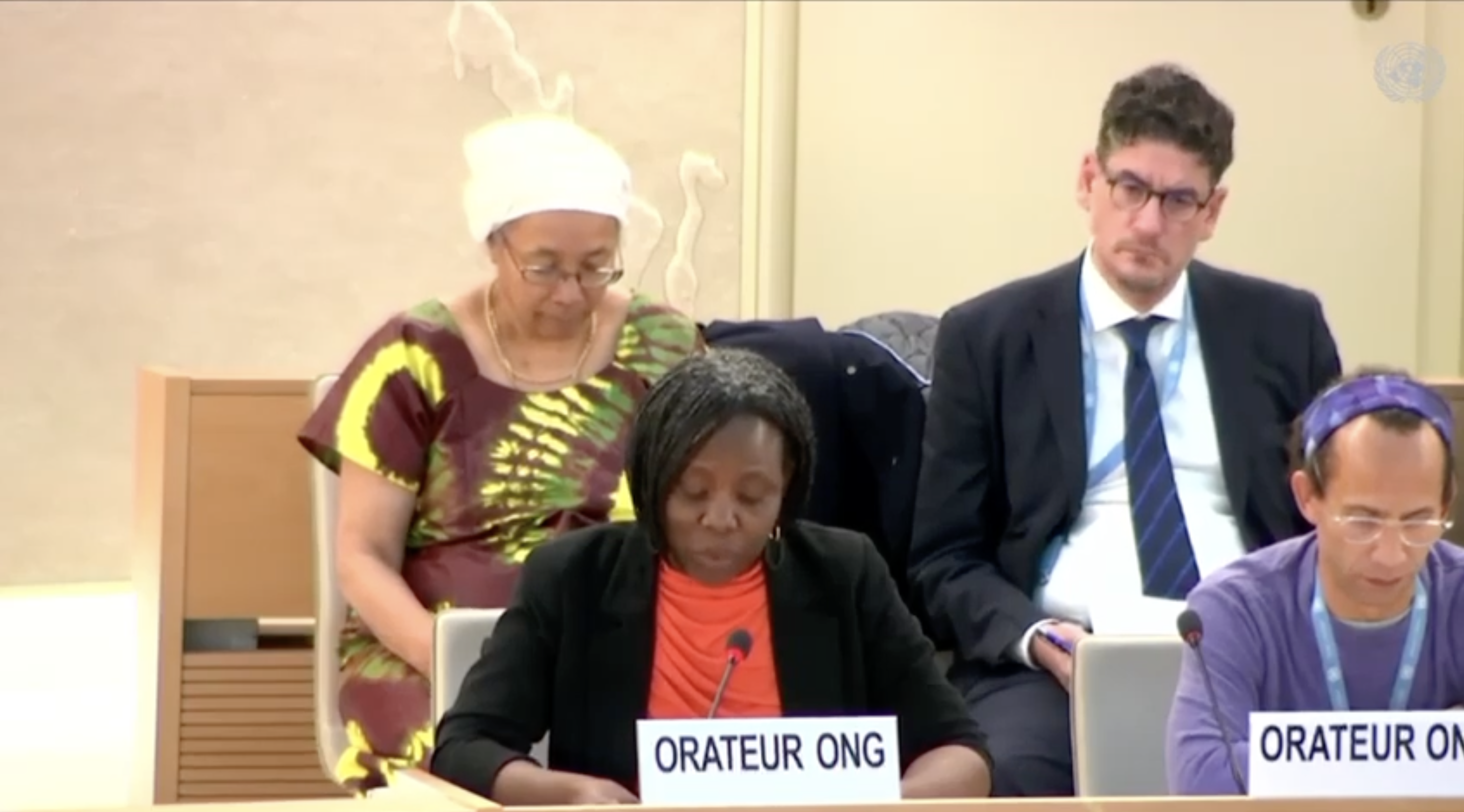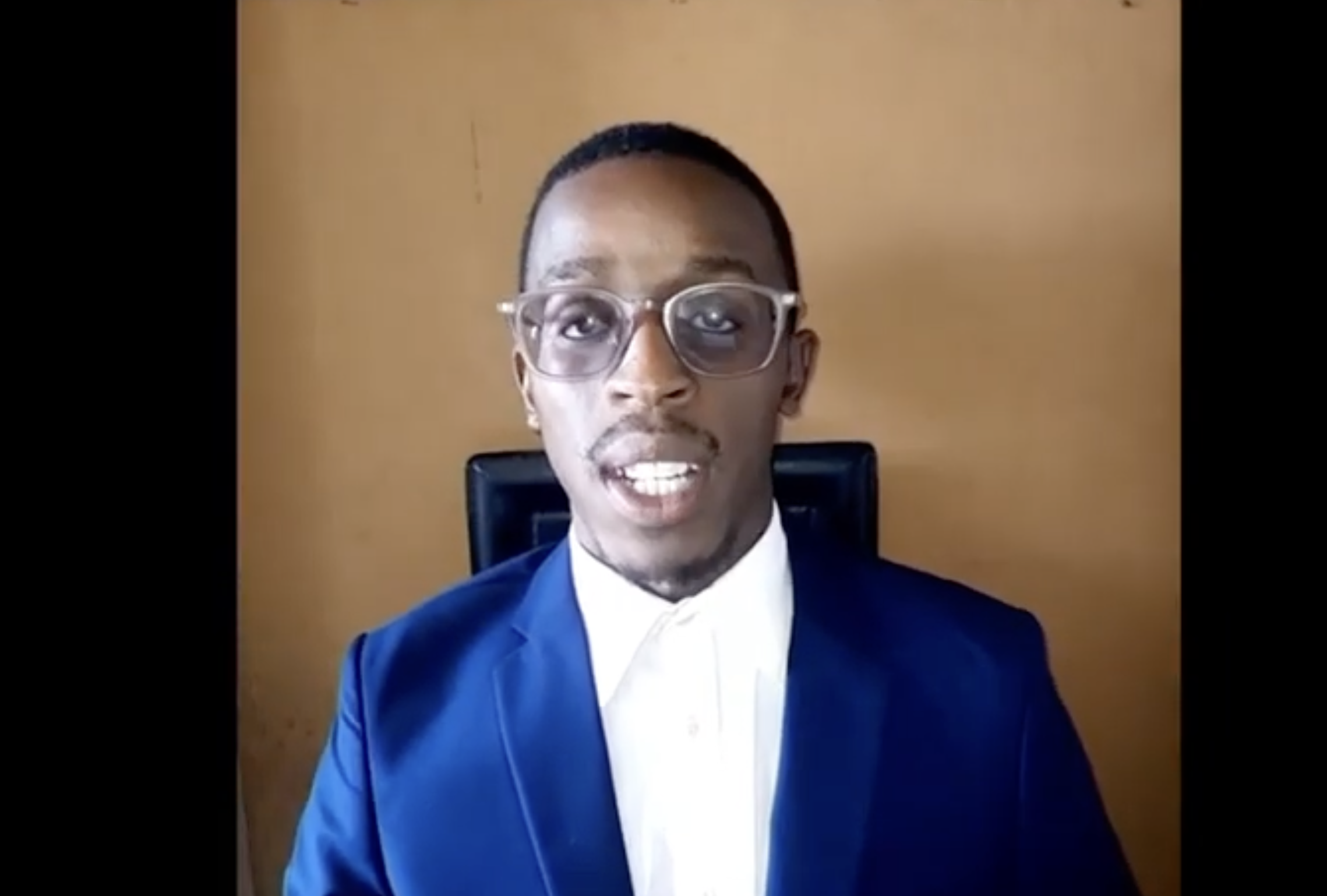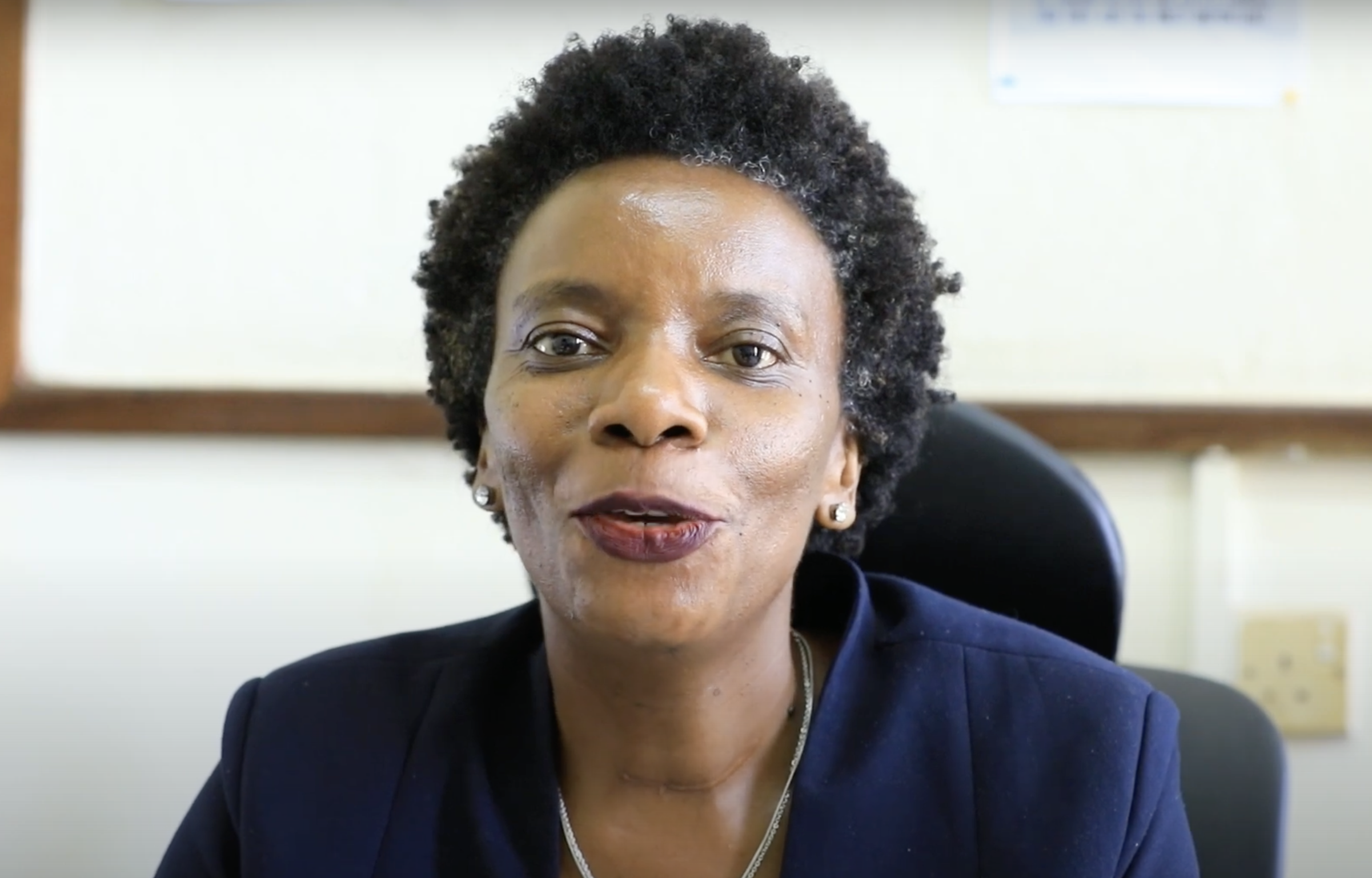HRC56: Addressing Sudan's Crisis - FFM Update and Dialogue
56th Session of the Human Rights Council
18 June – 12 July 2024
Item 2: Annual Report of the United Nations High Commissioner for Human Rights and reports of the Office of the High Commissioner and the Secretary-General
19 June 2024

By Marisa Were / GICJ
Executive Summary
The Oral Update on the Fact-Finding Mission (FFM) for Sudan occurred on 18 and 19 June 2024, during the 2nd and 3rd meetings of the 56th Session of the Human Rights Council. Mr Mohamed Chande Othman, Chair of the FFM for Sudan, presented an oral report detailing the working group's efforts since their appointment in December 2023. The update also addressed the severe impact on the civilian population since the onset of the war. He explained how the liquidity crisis and hiring freeze caused several months of delay in establishing an effective secretariat. Despite these challenges, the FFM Working Group has initially contacted victims and other humanitarian actors on the ground.
During the interactive dialogue, delegates from participating countries expressed deep concerns about the ongoing violations and abuses of human rights and international humanitarian law. They inquired about how the international community could support the mission and alleviate the suffering of the civilian population. Many delegates also called for a ceasefire in Sudan to ensure the safety and protection of the Sudanese people, who are at the heart of the violence.
Geneva International Centre for Justice (GICJ) urges enhanced cooperation between the FFM for Sudan, the international community, and Member States. GICJ encourages all involved parties to advocate for a ceasefire and to hold accountable those responsible for the continuous violations and abuses of human rights and international humanitarian law since April 15, 2023. GICJ also calls for constant and further assistance to the FFM for Sudan, both financially and intellectually, so that they are better equipped and capable of fulfilling their mandate to bring justice to the Sudanese civilian populations, who are unwilling victims of the conflict.
Background
The conflict in Sudan, ongoing for over a year, involves intense fighting between the Sudanese Armed Forces (SAF) and the Rapid Support Forces (RSF), extending from Khartoum to Darfur. This conflict has led to severe consequences for the civilian population, including widespread human rights violations such as killings, lootings, mass displacements, and gender-based violence.
Approximately 18 million people face food insecurity, with 5 million at risk of starvation. The conflict has resulted in significant infrastructure damage, including electricity, water, and communication lines, and has caused nearly 9 million people to be forcibly displaced, with 1.8 million fleeing to neighbouring countries. Additionally, children are being recruited and used as soldiers and health facilities have been attacked and destroyed, leaving many civilians without access to medical care.
In response to the human rights and humanitarian crisis caused by the ongoing armed conflict in Sudan, the Human Rights Council (HRC), through resolution A/HRC/RES/54/2, established an independent international FFM for Sudan on 11 October 2023. The FFM for Sudan aims to investigate and verify the facts, circumstances, and root causes of human rights and international humanitarian law violations and abuses, including those committed against refugees. All related crimes are viewed within the context of the ongoing armed conflict that began on 15 April 2023 between the SAF and RSF, as well as other warring parties.
The Mission’s Mandate is to:
- Collect, consolidate, and analyse evidence of human rights and international humanitarian law violations and abuses, including those affecting women and children, and systematically record and preserve all information, documentation and evidence.
- Document and verify relevant information and evidence through filed engagement and cooperate with judicial and other entities.
- Identify, where possible, those individuals and entities responsible for violations or abuses of human rights and international humanitarian law or other related crimes in Sudan to ensure that those responsible are held accountable.
- Make recommendations to end impunity, address its root causes, and ensure accountability, including, as appropriate, individual criminal responsibility and access to justice for victims.
- Cooperate and share best practices with other international, regional and domestic accountability initiatives as and when these are established.
Establishing the FFM for Sudan has an initial duration of one year. At the HRC’s request, the Commission had to provide an oral update on its work, which was to be followed by an interactive dialogue at the 56th Session in June – July 2024.
Oral Update
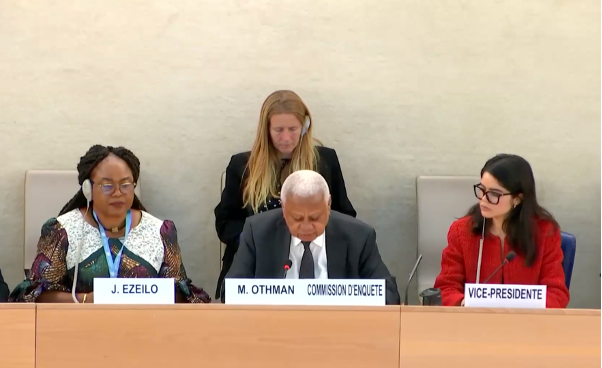 To begin his oral update, Mr Othman reminded participants at the HRC that Sudan has been in a devastating conflict for over a year since it started on 15 April 2023. He emphasised that as the war progressed, the civilian population continues to endure extreme violence and violations of their human rights. This includes cases of killings, looting, mass displacement, sexual violence, torture, and destruction of infrastructure and residential areas. Mr Othman also highlighted the challenges his mission has faced in conducting their work since their appointment in December 2023. Due to the liquidity crisis faced by the UN Secretariat and the hiring freeze, there was a delay in establishing an effective secretariat for the FFM for several months. However, thanks to the efforts of the High Commissioner for Human Rights and the Deputy High Commissioner, the FFM established a secretariat in the last months that began its work in Nairobi, Kenya.
To begin his oral update, Mr Othman reminded participants at the HRC that Sudan has been in a devastating conflict for over a year since it started on 15 April 2023. He emphasised that as the war progressed, the civilian population continues to endure extreme violence and violations of their human rights. This includes cases of killings, looting, mass displacement, sexual violence, torture, and destruction of infrastructure and residential areas. Mr Othman also highlighted the challenges his mission has faced in conducting their work since their appointment in December 2023. Due to the liquidity crisis faced by the UN Secretariat and the hiring freeze, there was a delay in establishing an effective secretariat for the FFM for several months. However, thanks to the efforts of the High Commissioner for Human Rights and the Deputy High Commissioner, the FFM established a secretariat in the last months that began its work in Nairobi, Kenya.
Nevertheless, Mr Othman clarified that even with these challenges, the mission's work has not just started. While waiting for an effective secretariat, the mission initiated contact with the Sudanese government and the governments of neighbouring countries such as the Central African Republic, Chad, Egypt, Eritrea, Ethiopia, Kenya, South Sudan, and Uganda, requesting their cooperation and access to their territories to get first-hand information from victims of the conflict, including those who have fled Sudan since the war began. So far, Kenya has responded positively, allowing the mission to visit Nairobi, where they met with several victims, witnesses, and experts. Additionally, the mission plans to visit Chad in the near future as they were pleased to receive confirmation from the government.
The FFM is also keen to visit Sudan and interact with the government to hear their perspectives. However, even without physical access to Sudan at the moment, the mission has been able to conduct around 80 interviews with victims and eyewitnesses. They have held meetings and consultations with a considerable number of stakeholders, including civil society, representative human rights defenders, journalists, academics, and specialised experts on child rights and sexual and gender-based violence.
So far, the information gathered has indicated that the conflict continues unabated and on a massive scale, which now involves multiple actors within and outside Sudan. Mr Othman stated that it is deeply concerning that the fighting has resulted in drastic consequences for the civilian population, as there have been credible accounts of indiscriminate attacks on civilians, residential areas, and infrastructure. This intense conflict and attacks on residential areas such as schools and hospitals have resulted in the killings of millions of civilians, including women and children or have forced many to leave their homes and property to seek refuge in other locations. Infrastructure such as electricity, water, and communication lines have also been significantly damaged.
Of particular concern was the information about the situation in Darfur, especially the siege of its capital, Al-Fashir, by the RSF, where approximately 800,000 internally displaced persons (IDPs) were being hosted. Then, on 8 June 2024, the last functioning hospital was taken, leading to its closure and leaving the civilian population without access to life-saving medical care. Many health facilities all over Sudan have been attacked, pillaged, and destroyed, making it impossible for many injured civilians to get any medical attention. It is noted that medical supplies have also been blocked from reaching critical areas, leaving reports of many civilians dying from injuries due to the unavailability and inaccessibility of medical attention and resources.
Currently, the FFM is investigating the early armed attacks against civilians based on ethnicity in other areas of Darfur, including killings, rape, and other forms of sexual violence, sexual torture, forced displacement, and looting. The FFM has heard from victims about their long and treacherous journeys from Khartoum to neighbouring countries, all in an attempt to escape the brutality and violence happening in Sudan. Within the country, there are many cases of sexual violence being committed by warring parties, women and girls are subjected to rape, gang rape, forced marriages and the denial of medical support due to access and familial support due to stigma, leading to the abandonment of many women and girls. In the case of children, there is widespread recruitment and use of children at checkpoints and as soldiers to gather intelligence, engage in direct combat, and commit violent crimes, placing the lives and futures of the children at risk.
Furthermore, Mr Othman stated that the FFM had identified several structural and systematic issues related to policy and conduct. These include problems revived from past conflicts, continued arming of civilians without meaningful control, mobilisation of militias and armed groups on an ethnic basis, and shielding from accountability. He then stated that the national legal system seems unable to conduct prompt and justifiable prosecutions consistent with international humanitarian standards.
In conclusion, Mr Othman ended his oral update by stating that there can only be improvement with an immediate ceasefire to allow for progress. He appealed for fighting to stop immediately and to dissolve the militias, as civilians must be protected, and perpetrators must be punished. Furthermore, he called on the warring parties to refrain from targeting humanitarian workers and to allow aid delivery. He also called on States with influence to actively step up efforts to appeal to the warring parties. Finally, he said the people of Sudan are crying for help to restore their dignity and rights, and they need the support of this council.
Interactive Dialogue with Delegates
Sudan
 Mr Bashir Elbukhari Suliman, the Chief Prosecutor of Sudan, began by mentioning more human rights and international humanitarian law violations and abuses committed mainly by the rebel forces, mentioning critically the massacre and the possible genocidal acts that have been committed. However, the main focus he presented was that of the National Courts of Sudan, highlighting that they aim to respect the process of fair trials, the right to defence and legal aid, all provided by the Ministry of Justice. He stated that the rebel forces have been classified as a terrorist organisation, according to the law and relevant Security Council resolutions. Nonetheless, he expressed that the national judicial systems are keen on upholding the rule of law, providing justice to victims, and ending impunity. He then went on to state that Sudan is ready to engage in technical cooperation and asked the international community for the following:
Mr Bashir Elbukhari Suliman, the Chief Prosecutor of Sudan, began by mentioning more human rights and international humanitarian law violations and abuses committed mainly by the rebel forces, mentioning critically the massacre and the possible genocidal acts that have been committed. However, the main focus he presented was that of the National Courts of Sudan, highlighting that they aim to respect the process of fair trials, the right to defence and legal aid, all provided by the Ministry of Justice. He stated that the rebel forces have been classified as a terrorist organisation, according to the law and relevant Security Council resolutions. Nonetheless, he expressed that the national judicial systems are keen on upholding the rule of law, providing justice to victims, and ending impunity. He then went on to state that Sudan is ready to engage in technical cooperation and asked the international community for the following:
- Provide technical assistance in criminal investigations and law enforcement.
- Call upon neighbouring countries to facilitate the work of the Sudanese Commission so that victims and stolen assets can be accessed.
- Assist in establishing an international fund for compensation.
- Assist in technical and legal assistance.
- Enact the principle of complementarity.
European Union
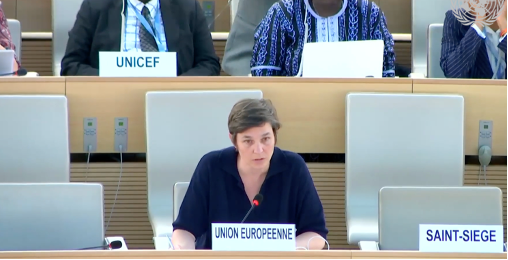 The European Union Delegate expressed deep alarm over the current situation, highlighting that it resulted in the largest global displacement crisis, with 20% of the population affected. She condemned the utter disregard for civilian lives, the prevalence of ethnic killings, and gender-based violence, along with the ongoing violence and the killing of aid workers. These conditions have exacerbated the crisis, pushing millions towards famine. She emphasised the necessity of protecting civilians by international law and issued a strong appeal for an immediate ceasefire. Additionally, she called on the international community to cooperate with the FFM and asked how the international community could contribute to accountability efforts.
The European Union Delegate expressed deep alarm over the current situation, highlighting that it resulted in the largest global displacement crisis, with 20% of the population affected. She condemned the utter disregard for civilian lives, the prevalence of ethnic killings, and gender-based violence, along with the ongoing violence and the killing of aid workers. These conditions have exacerbated the crisis, pushing millions towards famine. She emphasised the necessity of protecting civilians by international law and issued a strong appeal for an immediate ceasefire. Additionally, she called on the international community to cooperate with the FFM and asked how the international community could contribute to accountability efforts.
Norway, on behalf of the Nordic-Baltic Countries
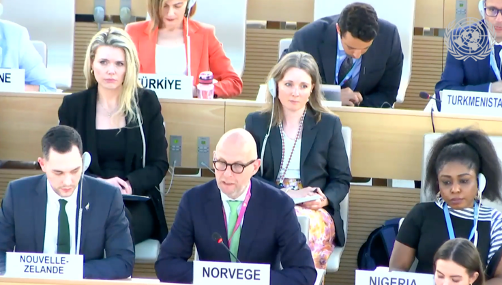 The Norwegian Delegate, representing Norway on behalf of the Nordic-Baltic countries, expressed regret over the halting of the FFM due to the UN liquidity crisis. He highlighted the severe humanitarian crisis, with over 10 million people displaced and millions on the verge of famine, compounded by gender-based violence and disappearances. Emphasising the need for accountability, he supported the International Criminal Court's (ICC) investigation into war crimes and crimes against humanity and condemned attacks on hospitals. He stressed that consequences must be enforced and urged all parties to agree to a ceasefire and adhere to international humanitarian law. Additionally, he called for cooperation with the FFM and questioned how regional actors could support its efforts.
The Norwegian Delegate, representing Norway on behalf of the Nordic-Baltic countries, expressed regret over the halting of the FFM due to the UN liquidity crisis. He highlighted the severe humanitarian crisis, with over 10 million people displaced and millions on the verge of famine, compounded by gender-based violence and disappearances. Emphasising the need for accountability, he supported the International Criminal Court's (ICC) investigation into war crimes and crimes against humanity and condemned attacks on hospitals. He stressed that consequences must be enforced and urged all parties to agree to a ceasefire and adhere to international humanitarian law. Additionally, he called for cooperation with the FFM and questioned how regional actors could support its efforts.
Pakistan, on behalf of the Organisation of Islamic Cooperation
The Pakistan Delegate, speaking on behalf of Pakistan and the Organisation of Islamic Cooperation (OIC), highlighted the ongoing loss of human lives. He expressed profound solidarity with the people of Sudan. He pointed out that millions of children urgently need life-saving assistance. Mr Ahmed urged the international community and humanitarian organisations to bolster support for Sudan and its neighbouring countries. Additionally, he called on all parties involved to reach a ceasefire to alleviate the suffering.
 New Zealand, on behalf of Australia and Canada
New Zealand, on behalf of Australia and Canada
The delegate representing New Zealand emphasised the devastating impact of the ongoing fighting on the Sudanese people, who are seemingly facing one of the world’s largest IDP humanitarian crises. He expressed deep concern over growing human rights violations, including the continuation of torture and gender-based violence. He urged all parties to halt the fighting, adhere to a ceasefire, and engage in negotiations, highlighting the importance of including local voices to achieve lasting peace. He also proposed a question to the FFM, asking how the international community can contribute to ensuring accountability for human rights abuses in Sudan.
United Kingdom, on behalf of Germany, Norway, and the United States of America
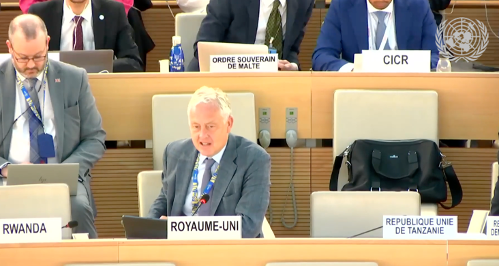 The Delegate of the United Kingdom condemned the ethnically motivated violence perpetrated by the RSF and emphasised the crucial role of the FFM. He criticised both warring parties for their collective actions, such as border closures and obstruction of aid, which has prevented essential assistance from reaching those in need and contributed to the worsening famine conditions. He called for an end to the war, urged the resumption of peace talks, and emphasised the need to use all available influence to promote peace and accountability in Sudan.
The Delegate of the United Kingdom condemned the ethnically motivated violence perpetrated by the RSF and emphasised the crucial role of the FFM. He criticised both warring parties for their collective actions, such as border closures and obstruction of aid, which has prevented essential assistance from reaching those in need and contributed to the worsening famine conditions. He called for an end to the war, urged the resumption of peace talks, and emphasised the need to use all available influence to promote peace and accountability in Sudan.
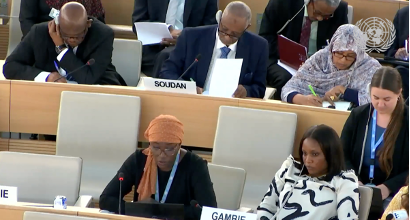 Gambia, on behalf of the African Group
Gambia, on behalf of the African Group
A Gambia delegate representing the African Group expressed solidarity with Sudan and highlighted the need for African solutions to African problems. She welcomed the assistance of regional organisations and emphasised that a ceasefire and humanitarian relief were an immediate priority. She then stated that the African Group does not support external interference and urged all parties to refrain from undermining efforts. Finally, she called for continued dialogue among the warring parties to achieve a peaceful transition to democracy and appreciated the cooperation of the Sudanese government.
Egypt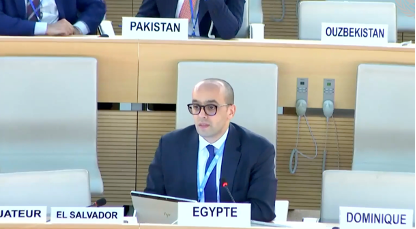
The Egyptian delegate called for increased humanitarian assistance and an end to foreign interference to preserve Sudan’s wealth and the lives of its citizens. He announced that a conference at the end of the month in Egypt would seek to build sustainable peace based on a Sudanese vision, stressing the importance of respecting Sudan’s sovereignty, territorial integrity, and State institutions. He noted that neighbouring countries are coordinating their efforts to address and help alleviate the refugee and IDP crisis.
Ireland
 The Ireland Delegate aligned with the EU statement and expressed concern over the continuation of gender-based violence. She noted that attacks by the RSF are exacerbating the risk of gender-related crimes. She highlighted the troubling trend of arrests and detentions of human rights defenders and community experts. She called for the protection of civil society. She emphasised the vital need to support the FFM, posing the question of what actions States can take to ensure its continued operation.
The Ireland Delegate aligned with the EU statement and expressed concern over the continuation of gender-based violence. She noted that attacks by the RSF are exacerbating the risk of gender-related crimes. She highlighted the troubling trend of arrests and detentions of human rights defenders and community experts. She called for the protection of civil society. She emphasised the vital need to support the FFM, posing the question of what actions States can take to ensure its continued operation.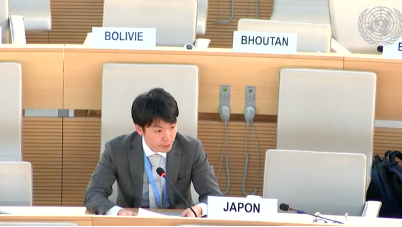
Japan
The Japanese Delegate stressed the importance of women's meaningful participation in the government and the overall transition process. He supported the efforts of the International Group for the Assessment and Response to the Crisis (IGART) and committed to working with Sudan to support its transition efforts.
UN Women
 UN Women expressed grave concern over violations and abuses of women’s and girls’ rights in Sudan, noting that the conflict has shrunk protective spaces and increased exposure to violence. She called for measures to combat conflict-related violence, including the establishment of specialised centres, and emphasised the need to protect women from all forms of violence. She urged for safe passage across borders, enforcement of protection measures, and accountability for perpetrators, standing in solidarity with Sudanese women and girls.
UN Women expressed grave concern over violations and abuses of women’s and girls’ rights in Sudan, noting that the conflict has shrunk protective spaces and increased exposure to violence. She called for measures to combat conflict-related violence, including the establishment of specialised centres, and emphasised the need to protect women from all forms of violence. She urged for safe passage across borders, enforcement of protection measures, and accountability for perpetrators, standing in solidarity with Sudanese women and girls.
Eritrea
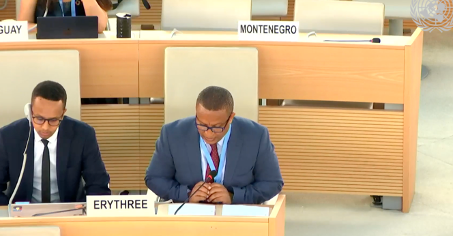 The delegate of Eritrea acknowledged the oral report from the FFM and emphasised that Eritrea is closely monitoring the situation in Sudan. He underscored the importance of respecting Sudan’s sovereignty, unity, and territorial independence in addressing the crisis. He highlighted the role of the National Commission of Investigation in ensuring justice for victims and accountability for perpetrators, regardless of their rank. Eritrea commended Sudan for its demonstrated cooperation and expressed solidarity with the Sudanese people during these challenging times.
The delegate of Eritrea acknowledged the oral report from the FFM and emphasised that Eritrea is closely monitoring the situation in Sudan. He underscored the importance of respecting Sudan’s sovereignty, unity, and territorial independence in addressing the crisis. He highlighted the role of the National Commission of Investigation in ensuring justice for victims and accountability for perpetrators, regardless of their rank. Eritrea commended Sudan for its demonstrated cooperation and expressed solidarity with the Sudanese people during these challenging times.
Chad
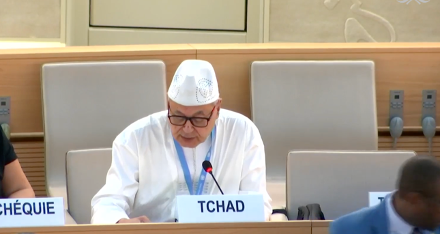 The delegate of Chad aligned with the African Group and thanked the FFM for its oral update. He expressed concern over the situation in Sudan and urged all parties to respect human rights and international obligations. He reaffirmed Chad's solidarity with Sudan and noted that its borders will remain open to refugees from Sudan. He praised efforts to support dialogue and emphasised the principle of finding African solutions to African problems, underscoring the importance of Sudan’s sovereignty and political unity.
The delegate of Chad aligned with the African Group and thanked the FFM for its oral update. He expressed concern over the situation in Sudan and urged all parties to respect human rights and international obligations. He reaffirmed Chad's solidarity with Sudan and noted that its borders will remain open to refugees from Sudan. He praised efforts to support dialogue and emphasised the principle of finding African solutions to African problems, underscoring the importance of Sudan’s sovereignty and political unity.
Uganda
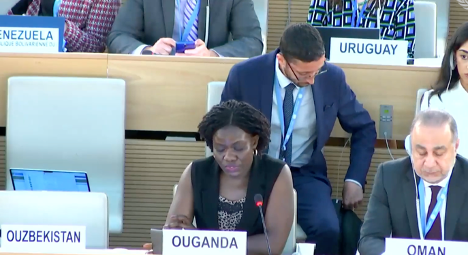 The Uganda Delegate stated that Uganda aligned with the African Group and spoke about the severe consequences of the ongoing war, including loss of life, destruction, and a crisis affecting millions of internally displaced persons. She called for an end to the violence and expressed gratitude for international efforts but emphasised the need for more support. She advocated for inclusive dialogue to restore peace and stability and pledged continued bilateral and framework support to help Sudan reach peace.
The Uganda Delegate stated that Uganda aligned with the African Group and spoke about the severe consequences of the ongoing war, including loss of life, destruction, and a crisis affecting millions of internally displaced persons. She called for an end to the violence and expressed gratitude for international efforts but emphasised the need for more support. She advocated for inclusive dialogue to restore peace and stability and pledged continued bilateral and framework support to help Sudan reach peace.
South Sudan
The delegate of South Sudan als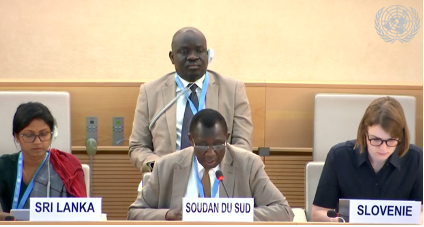 o aligned with the African Group’s statement, highlighting the need for unified initiatives to achieve desired outcomes. He called for a ceasefire to save lives and protect civilians and urged the international community to safeguard Sudan’s sovereignty and political unity.
o aligned with the African Group’s statement, highlighting the need for unified initiatives to achieve desired outcomes. He called for a ceasefire to save lives and protect civilians and urged the international community to safeguard Sudan’s sovereignty and political unity.
Concluding Remarks
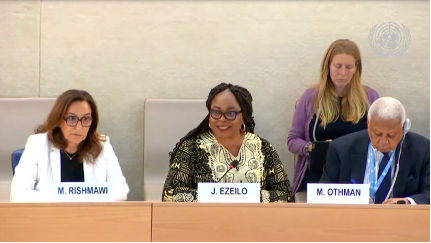 In the concluding remarks, Ms Joy Ngozi Ezeilo, the United Nations Special Rapporteur, emphasised the critical need for accountability in Sudan. She noted the fragility of the municipal justice system, which is inadequate to meet the justice needs of victims of human rights and international humanitarian law violations. She referenced a troubling case of a 19-year-old Sudanese woman who was gang-raped, faced significant barriers to accessing abortion services, and was disowned by her family. Ms Ezeilo highlighted the vast justice needs and the importance of accountability for long-term peace and justice within regional and international human rights frameworks.
In the concluding remarks, Ms Joy Ngozi Ezeilo, the United Nations Special Rapporteur, emphasised the critical need for accountability in Sudan. She noted the fragility of the municipal justice system, which is inadequate to meet the justice needs of victims of human rights and international humanitarian law violations. She referenced a troubling case of a 19-year-old Sudanese woman who was gang-raped, faced significant barriers to accessing abortion services, and was disowned by her family. Ms Ezeilo highlighted the vast justice needs and the importance of accountability for long-term peace and justice within regional and international human rights frameworks.
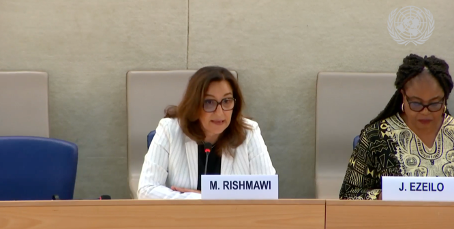 Then, Ms Mona Rishmawi, Head of Office Political Affairs – OSE Syria, expressed gratitude to all states participating in the meeting. She then addressed the question regarding how the international community and States can support the FFM by providing six solutions:
Then, Ms Mona Rishmawi, Head of Office Political Affairs – OSE Syria, expressed gratitude to all states participating in the meeting. She then addressed the question regarding how the international community and States can support the FFM by providing six solutions:
- By providing information on the situation in Sudan, which the FFM will then objectively and independently verify.
- By facilitating access to victims.
- Putting pressure on parties to end hostilities.
- Granting humanitarian access.
- Supporting civil society in documenting violations.
- Aiding victims and human rights defenders.
Position of Geneva International Centre for Justice
Geneva International Centre for Justice (GICJ) stands in unwavering support of the Fact-Finding Mission for Sudan and its crucial mandate to address the severe humanitarian and human rights crisis unfolding in Sudan. We commend the FFM's dedicated efforts despite significant challenges, including the liquidity crisis and delays in establishing an effective secretariat. The FFM’s commitment to documenting and investigating the atrocities committed since the conflict's onset is vital for ensuring accountability and justice for the victims.
Yet, GICJ remains highly concerned about the ongoing violence and growing human rights violations that continue. The reports of indiscriminate attacks on civilians, widespread sexual and gender-based violence, and the severe obstruction of humanitarian aid underscore the urgent need for a comprehensive and immediate response from the international community, as suggested by Ms Mona Rishmawi.
GICJ urges States to actively support the FFM by providing necessary financial and logistical resources to ensure the mission can effectively fulfil its mandate. States must work together to enforce an immediate ceasefire, facilitate safe and unhindered humanitarian access, and hold all perpetrators of human rights and international humanitarian law abuses accountable. To achieve this, States must leverage their influence to push for genuine peace negotiations and the protection of civilians.
#HRC56 #HumanRightsCouncil #FactFindingMission #Sudan #OralUpdate #HumanRights #Ceasefire #Accountability #HumanitarianAid #GenderBasedViolence #ChidlrensRights #PeaceNegotiations #HumanRightsDefenders #GICJ #Geneva4Justice #GenevaInternationalCentreforJustice




